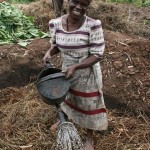To rank countries and illustrate trends in hunger worldwide, IFPRI, Concern Worldwide, and Welthungerhilfe developed the Global Hunger Index (GHI), which captures four indicators of hunger: undernourishment, child wasting, child stunting, and child mortality. Using data from the Food and Agriculture Organization of the United Nations (FAO), the World Health Organization (WHO), and UNICEF, the index ranks countries on a 100-point scale, with 0 being the best score (no hunger) and 100 being the worst. The GHI is updated annually to track progress. By highlighting this information, the index serves as a tool for mobilizing political will and promoting effective policies to combat hunger. For more than a decade, the GHI has helped to increase country accountability in order to reduce hunger and undernutrition.
Realigning Agriculture to Improve Nutrition (RAIN)
MOTIVATION Stunting, a result of chronic undernutrition, is highly prevalent in Zambia, affecting one million children younger than five years old (45 percent of all children). In Mumbwa District, Central Province, where the Realigning Agriculture to Improve Nutrition project is underway, the prevalence rises to 59 percent. Chronic undernutrition is caused by a combination of >> Read more
2020 Vision Conference: Leveraging Agriculture for Improving Nutrition and Health
MOTIVATION Agriculture, nutrition, and health are inseparably linked—agriculture provides food to nourish people so they can lead healthy lives, and productive agriculture requires the labor of healthy, well-nourished people. But can agriculture do more to improve human health and nutrition? In February 2011, IFPRI’s 2020 Vision Initiative brought together the agriculture, nutrition, and health sectors >> Read more
Ethiopia Strategy Support Program
In Ethiopia, as in many countries, development strategies face design, implementation, and monitoring challenges. In 2004, IFPRI launched the Ethiopia Strategy Support Program—in partnership with the government of Ethiopia and regional partners—to cultivate country specific solutions.
Country Development Strategies
Country development strategies link investment choices with development objectives supporting poverty reduction and economic growth. However, within many countries, policy choices are difficult because policymakers don’t have enough internal support to generate the information they need to make good decisions and prioritize investments. Within this context, IFPRI’s research aims to generate new knowledge, build local capacity, and create policy dialogues that support agricultural and rural growth and reduce poverty.
The Malawi Strategy Support Program
Malawi ranks among the world’s most densely populated and least-developed countries. Because agriculture is the main source of income for most of the population, the development of targeted policies that spur growth in the sector, particularly in smallholder-based agriculture, is critical to meeting the country’s food security and poverty reduction goals.


